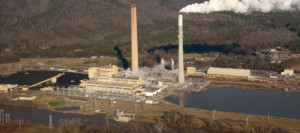November 17th, 2020 – 4:20 PM
Georgia Power –

Georgia Power continues to make progress towards the closure of four ash ponds at Plant Hammond with the dewatering process scheduled to begin in December. Dewatering marks a significant step towards completing the closure process, and Georgia Power’s ash pond closure plan for Plant Hammond is specifically designed for the site to help ensure water quality is protected every step of the way.
Three ash ponds at Plant Hammond will be completely excavated, with the ash stored in a permitted, lined landfill and one ash pond will be closed in place using proven engineering methods and closure technologies. Ash pond closures are site-specific and consider multiple factors, such as pond size, location, geology and amount of material; and each closure is certified by a team of independent, professional engineers.
“As we begin the dewatering process at Plant Hammond, we are pleased with the progress we have made on our ash pond closures at all of our plants across the state,” said Dr. Mark Berry, vice president of Environmental & Natural Resources for Georgia Power. “We continue to focus on safety and meeting all requirements throughout the process to fulfill our longstanding commitment to protect the environment, our local communities and water quality every step of the way. Throughout the process, clear communication to our customers and the community about our progress remains a priority.”
The ash pond dewatering plan for Plant Hammond has been approved by the Georgia Environmental Protection Division (EPD) and describes the water treatment system, controls and monitoring that will be used during the process to help ensure that the water discharged is protective of water quality standards. The planned on-site closure methods are being permitted and regulated by the EPD.
Communication regarding the closure plan is provided through EPD permitting notifications as well as posting on Georgia Power’s website. To read more about Plant Hammond’s ash pond closure and dewatering process, click here.
Georgia Power first announced plans to permanently close all of its ash ponds in September 2015, with initial plans released in June 2016. Georgia Power’s ash pond closure plans fully comply with the federal Coal Combustion Residuals (CCR) rule, as well as the more stringent requirements of Georgia’s state CCR rule. Georgia was one of the first states in the country to develop its own rule regulating management and storage of CCR such as coal ash. The state rule, which goes further than the federal rule, regulates all ash ponds and landfills in the state and includes a comprehensive permitting program through which the EPD will approve all actions to help ensure ash pond closures are protective of water quality.
Protecting Water Quality
Since 2016, Georgia Power has installed more than 550 groundwater monitoring wells around its ash ponds and on-site landfills to actively monitor groundwater quality to help ensure the company is being protective of lakes, rivers and drinking water. In 2020 alone, there have been 1,292 groundwater samples collected and 54 groundwater reports completed.
Third-party professional engineers and geologists direct the appropriate placement of monitoring wells for Georgia Power based on site-specific geology. Independent, third-party professionals perform sampling, with analysis by accredited, independent laboratories.
Monitoring is being conducted in compliance with federal and state laws and regulations. The first round of testing was completed with results published in August 2016, more than 18 months ahead of federal requirements, and the company continues to post testing results on Georgia Power’s website and report them to the EPD.
Dewatering Process
The dewatering process marks a significant step towards completing the ash pond closure process and is now underway at six sites: Plants Bowen, McDonough, McManus, McIntosh, Branch and Yates, with plans approved by the EPD for Plant Mitchell. Georgia Power’s commitment to protecting water quality of surface waters, such as lakes and rivers, includes comprehensive and customized dewatering processes during ash pond closures. The company’s process treats the water to help ensure that it meets the requirements of the plant’s wastewater discharge permits approved by the EPD and is protective of applicable water quality standards.